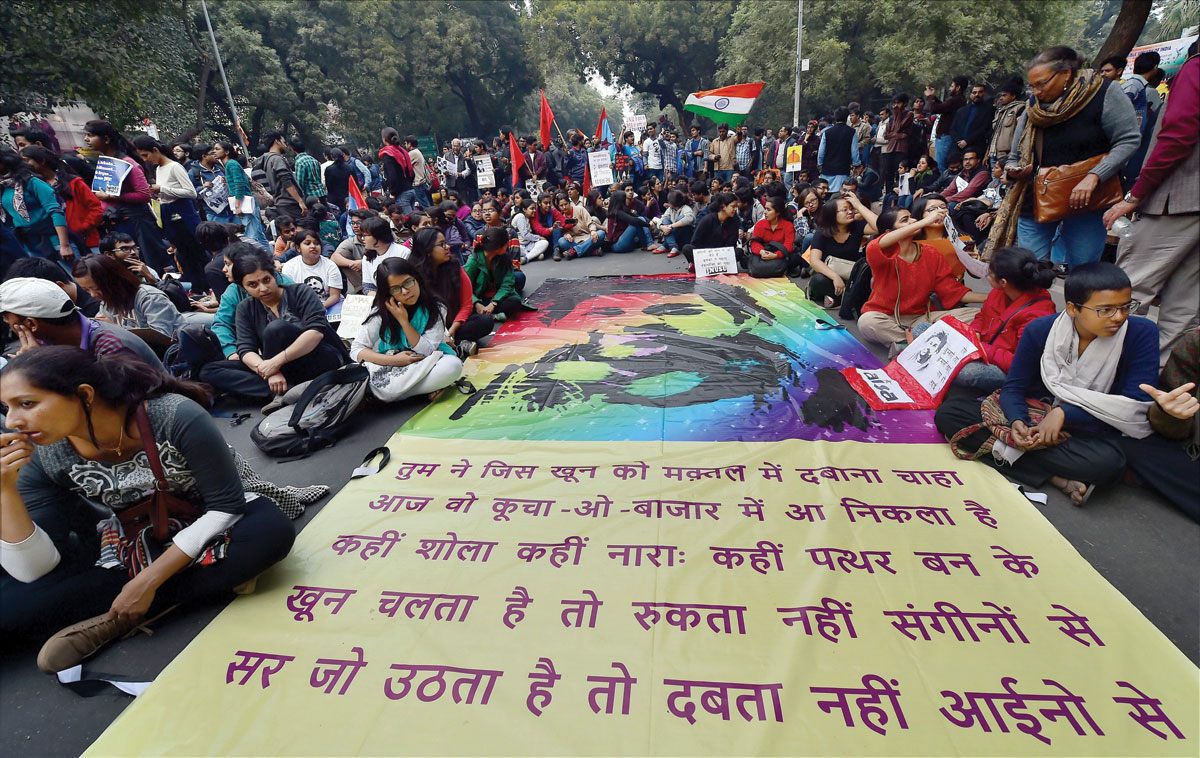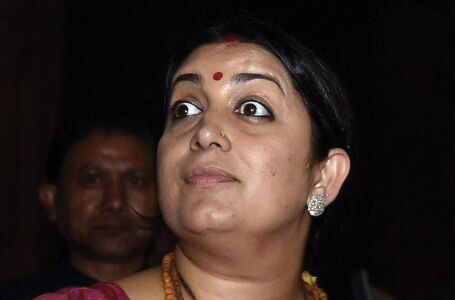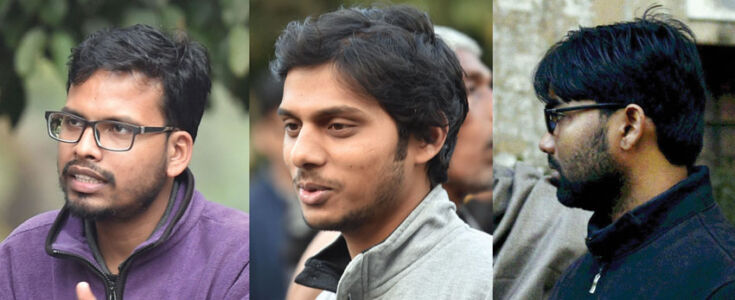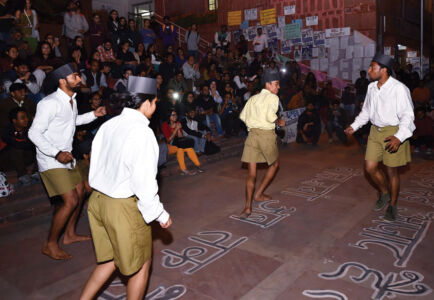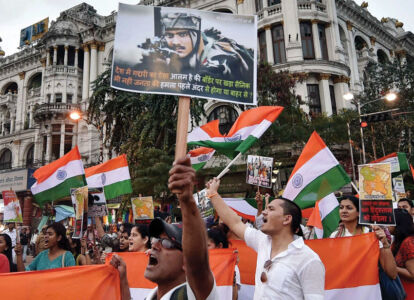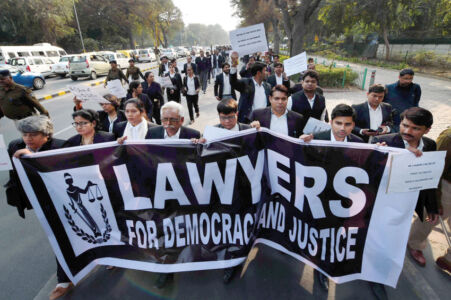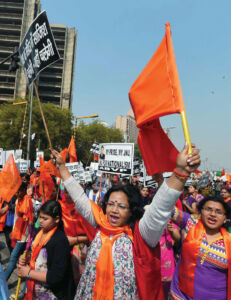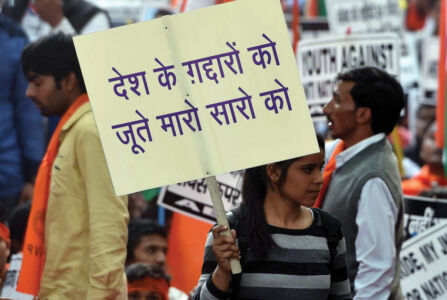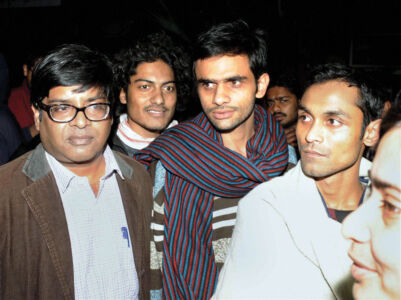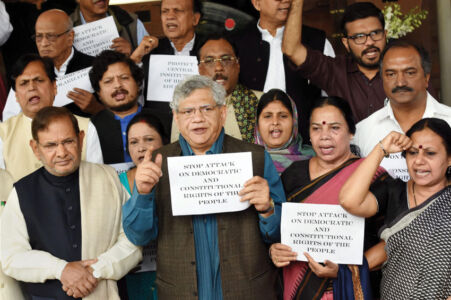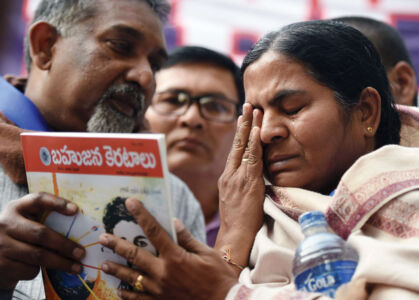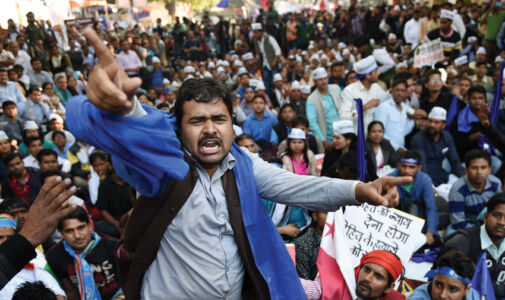VICTIMS OF HEARSAY POLITICS?
Students from various organizations during their march from Mandi House to Jantar Mantar in solidarity with the JNUSU President Kanhaiya Kumar, in New Delhi, Feb. 18. (Kamal Singh | PTI)
A major political storm has engulfed India, the Indian Parliament, and the living rooms of citizens of the country, and is still being debated as angry student protests are growing outside on the streets. It is still not clear who exactly should be blamed for the alleged sedition. There is a strong flow of slander and rebuttal from either side as there is very little credible proof to support the claims by either side. Political leaders, news media and other bigwigs meanwhile have been actively taking sides in speaking for and against both the JNU students and the government, based on their perception of the situation. Before we start to take sides, shouldn’t there be an explanation as to why, if at all, were the “anti-national” slogans allowed repeatedly, why did the police, or JNU administration, or students, not stop or react to alleged “outsiders” raising any kind of anti-national slogans. How can raising the country’s national flag on the university campus even be an issue for any Indian. The matter involving sedition charges is still awaiting a court verdict. While Kanhaiya was granted bail for six months, two other JNU students are still in custody, but the political brouhaha is far from over. A Siliconeer report from PTI inputs. (@siliconeer, #siliconeer, #JNU, #KanhaiyaKumar, #FreedomofSpeech, #IndianStudents, #IndianParliament, @narendramodi)
[pullquote]”We make a humble submission to you to make a call to the young brilliant minds of our nation not to indulge in or become victims of the ideological warfare and thereby, waste their time, energy and national resources, but to engage in promotion of serious scholarship that would take the nation forward,” – IIT-B’s appeal to President Pranab Mukherjee.[/pullquote]
JNUSU leader Kanhaiya Kumar was slapped with a sedition charge based on a video clip of the controversial event at Jawarharlal Nehru University aired by a Hindi news channel. According to the FIR, police slapped the case of sedition, Feb. 11, after obtaining the video clip of the event, held two days earlier, from the channel though policemen were present at the event.
Police had arrested Kumar on Feb. 12, accusing him of making anti-India remarks at the event organized by a Leftist students’ union to protest against the hanging of Parliament attack convict Afzal Guru. Students of JNU have been maintaining that Kumar never raised such objectionable slogans.
In the later stages of investigation, the police acquired two more video clips.
According to the FIR, the video showed that students raised pro-Pakistan slogans at the event. It said around 80-90 students were present at the event.
The FIR said police also obtained from the university authorities the posters of the event one of which said “…collective conscience against the judicial killing of Afzal Guru and Maqbool Bhat, in solidarity with the valiant people of Kashmir.”
Delhi Police also registered a case in connection with alleged assault on an advocate after he was targeted by persons dressed in lawyers’ robes at Patiala House court for speaking in favor of JNUSU president Kanhaiya Kumar.
A group of persons dressed as lawyers, led by Vikram Singh Chauhan, unleashed a brazen attack on journalists and JNUSU president Kanhaiya Kumar at the Patiala House Courts complex, two days after they were caught on camera thrashing scribes and JNU students and teachers branding them as “anti-nationals.”
Before Kanhaiya was produced in court, a group of persons dressed as lawyers were seen jostling with another group of lawyers allegedly targeted for speaking in favor of the arrested student leader. One of them was also allegedly assaulted and a police complaint was lodged later in the day.
Kanhaiya didn’t raise any slogan: JNU security
A security guard at JNU campus and a policeman, said to be eyewitnesses who have also recorded their statements in the sedition case, have been purportedly seen in a sting video saying that JNUSU president Kanhaiya Kumar did not raise any slogan.
Earlier, a similar sting operation was conducted on two of the three lawyers who allegedly assaulted journalists, JNU students and teachers at Patiala House court, and were later arrested.
In the latest sting by a TV channel, the security guard who identifies himself as Amarjeet Kumar could be seen claiming that he was present at the February 9 event on the JNU campus. Asked about Kanhaiya, he said the student leader delivered a speech at Ganga dhaba after the end of a march that started from Sabarmati dhaba. He also claimed that he had not seen Kanhaiya raising any slogan. The guard, in the sting video, could also be seen saying that around 10-15 outsiders were present in the event, which was held despite being denied permission by JNU authorities.
The other person who had identified himself as Delhi Police head constable Rambir could be seen saying that he was present at the event in plain clothes. He was also seen saying that the JNUSU President was present in the crowd but he did not raise any slogans.
The head constable, in the sting operation video, could also be seen claiming that the protest against the hanging of Parliament attack convict Afzal Guru was organized in the past two years also but nothing of this sort had happened.
Asked why the police did not stop the event, he claimed that there was no police present inside the campus as it needs the permission of the Vice Chancellor. However, he had informed his seniors about the incident.
“Kanhaiya was there in the crowd but I did not see him raise any slogan. Khalid was clearly raising slogans and that is also evident from what is being shown on TV,” the policeman is seen saying in the sting video.
India downplays U.S. Ambassador’s remarks advocating free speech
“Where is the doubt that we do not have diversity on our campuses or the free thought in India is curtailed in any way.
Very vigorous debate that we have seen in Parliament itself is an example of diversity of thought and opinion in India,” External Affairs Ministry spokesperson Vikas Swarup said in New Delhi, Feb. 25.
He was asked about India’s position on Ambassador Verma’s recent remarks, made twice in as many days, that diversity of “thought and speech” was one of India’s great hallmarks which will “propel” it forward.
When asked about JNU row, Ambassador Verma had said, “It will be hard to find a country more diverse than India. That is a great attribute of this country. It is what will propel India forward in the next century. That’s also a part of both of our democracies, particularly on college campuses and it is something both of our countries frankly have celebrated and welcomed over years and over decades and these are called the laboratories of thoughts.
“Ultimately this is a question for Indian society to resolve. It is one of the great hallmarks of India and US to have this diversity of thought and diversity of speech and the fact is we are constitutional democracies, where speech is a central tenet of what we hold dear.”
President Mukherjee for thorough revision of IPC
Amid a raging debate on the sedition law, President Pranab Mukherjee today said the Indian Penal Code (IPC) requires a thorough revision to meet the needs of the 21st century and changes are necessary in the “archaic” police system.
In the light of the sedition law being applied on JNU students for allegedly raising anti-national slogans, there have been strong calls for either deletion or drastic changes in Section 124 A of IPC dealing with sedition.
No room for sedition in a democratic country: Admiral Ramdas
The slapping of sedition charges on JNU students for holding an event is “ridiculous” and there is no room for any such law in a democratic country, former Navy chief Admiral (retd) Lakshminarayan Ramdas said in New Delhi, Feb 27.
Ramdas who was addressing the JNU students during a lecture titled “De-militarization of nationalism,” said, “they are all doctored videos. Even if anti-national slogans were raised did anybody verify who shouted them. Booking random students for sedition is ridiculous. There is no room for any such law in a democratic country.”
Ramdas who visited the campus to express solidarity with the three arrested students—Kanhaiya Kumar, Umar Khalid and Anirban Bhattacharya, said, “no nation can be strong just by posing its military might, nation is built of its people.”
“The security agencies and government should first see if the case is worth filing sedition. The idea of nationalism is not restricted only to the military and its men, in fact it is a much broader term.
“Nationalism is a 17th century thing which started in Europe and we are still applying it in the 21st century.
Moreover, it is an idea that should be boundary less, not restricted to only a few people,” he added.
Institutes have become haven for anti-India activity: IIT-B faculty
A group of IIT Bombay faculty members has said that some institutes of higher learning have become “safe haven” for activities that are not in nation’s interests and urged President Pranab Mukherjee to convey students to not become “victims of the ideological warfare” on campuses.
The petition of the 60 members comes in the wake of a statement issued by another group of IIT-B faculty members, which came out in support of the agitating JNU students and said the State should not dictate meaning of “nationalism.”
In a letter to the President, the 60 members of the institute claimed that the JNU row “undermines” national interest and provides ample indication that certain groups are trying to “make use” of the young minds in premier institutions to create an environment of “abuse and acrimony” instead of “peace and harmony.”
“Besides JNU, we note that certain other institutes of higher learning are also treated as safe haven for activities that are not in national interests. Some of the brilliant young minds, instead of engaging themselves in activities that would provide a healthy atmosphere for the educational institutions to become academically highly productive, involve themselves under the pretext of freedom of expression in activities that vitiate the academic atmosphere.
“We make a humble submission to you to make a call to the young brilliant minds of our nation not to indulge in or become victims of the ideological warfare and thereby, waste their time, energy and national resources, but to engage in promotion of serious scholarship that would take the nation forward,” they wrote to the President.
On February 20, another group of IIT-B’s faculty members had condemned the “overreach” of the State in various educational institutions and alleged attempts to stifle dissent and suppress differences.
“The State cannot dictate on the many meanings of what it is to be Indian or mandate the meaning of nationalism. Rather, the State should be the one that makes sure that multiple ways of imagining one’s relationship with the nation are allowed to flourish especially when it might contradict dominant ways of thinking,” the faculty members had said in a joint statement.
Abdullah disapproves of JNU event on Afzal Guru hanging
Former Jammu and Kashmir Chief Minister and NC patron Farooq Abdullah today disapproved of the event at JNU on the death anniversary of Parliament attack convict Afzal Guru, saying it has “discredited” the university.
“What was the necessity to bring in Afzal Guru into the campus? Whosoever raised the issue did a wrong thing. He has discredited and brought a bad name to JNU,” he told reporters.
He, however, said “had police not been called in, the VC could have controlled the situation… When the issue got ignited, the country was on fire.”
JNU students march to parl: Demand repeal of sedition law
JNU students marched to Parliament, Mar. 2, demanding repeal of the sedition law and enactment of a Rohith Act to end caste based discrimination in educational institutions.
“Sedition is a very archaic law and imposing them upon students for a campus debate is just splitting the hair too much. Academicians across the globe believe that there is no place for such laws in a democracy, this should go. We appeal the government to repeal it,” JNUSU Vice President Shehla Rashid Shora said, while addressing the agitating students.
“We also demand that the government formulates a Rohith Vemula Act to end caste based discrimination in educational institutions,” she added.
The march was joined by students and teachers from universities across Delhi including DU, Jamia and Ambedkar University.
Cheers of ‘azaadi,’ ‘laal salaam’ as Kanhaiya gets interim bail
Cheers of “Azaadi” and “lal salaam” marked the celebrations which broke out among JNU students and teachers camping outside Parliament street police station, the moment they got to know about JNUSU president Kanhaiya Kumar has been granted bail in a sedition case.
“Its a big victory for us in the struggle which has a long way to go. We have been waiting for Kanhaiya to be back on campus ever since he was sent to jail in a sedition case.
It’s a huge relief for us and we will continue our struggle for Umar and Anirban who are still in jail, ” JNUSU Vice President Shehla Rashid Shora said while addressing the gathering.
Lenin, former JNU students union president said, “this will give our movement against the government an unprecedented strength and our faith will be reinforced that truth wins.
They tried their best to establish him as a terrorist but could not find a single evidence against him despite their intensive investigation for 18 days.”
Kanhaiya was granted interim bail, Mar. 2, for six months by the Delhi High Court which said that he has to cooperate in the ongoing investigation and has to present himself before the investigators as and when required.
Kanhaiya, arrested in a sedition case, was granted interim conditional bail for six months Mar. 2, by the High Court, which said he will “not participate actively or passively in any activity which may be termed as anti-national.”
The HC also enjoined on him, as president of JNU students union, that he “will make all efforts within his power to control anti-national activities in the campus.”
“Our nationalism is different from theirs. We want freedom from poverty, corruption, intolerance, communalism and fascism. We will snatch that freedom from the government because it is our right,” Rama Naga, General Secretary, JNUSU said.
Families of Rohith Vemula, Dalit research scholar who was found hanging in Hyderabad University hostel, as well as Umar Khalid, who is in custody in a sedition case, also joined the celebrations.
“My son Kanhaiya has been granted bail as they had no evidence against him. Umar and Anirban will also be home soon.
We have hope and we have faith in our judiciary if not our government,” Umar’s father SQ Iliyas said.
Delhi Police not playing fairly: Kanhaiya’s lawyer
JNUSU leader Kanhaiya Kumar’s lawyer Vrinda Grover accused Delhi Police, Mar. 2, of “not playing fairly” by not placing before the High Court the state government’s forensic report that two video clippings of the controversial JNU event were “manipulated.”
“Last evening, Delhi government got its report to show that there is manipulation in the audio. The police did not play fairly, did not speak honestly and did not present this part to the court (today). The observations of the court are coming in the light of the fact that the court has actually not been given all the material,” she said.
A forensic probe ordered by Delhi government of certain video clippings of the JNU event has found that two videos were “manipulated” where voices of persons not present in the clips were added.
Grover welcomed the High Court’s decision to grant interim conditional bail to Kanhaiya and said conditions imposed on him are “usual and general.”
